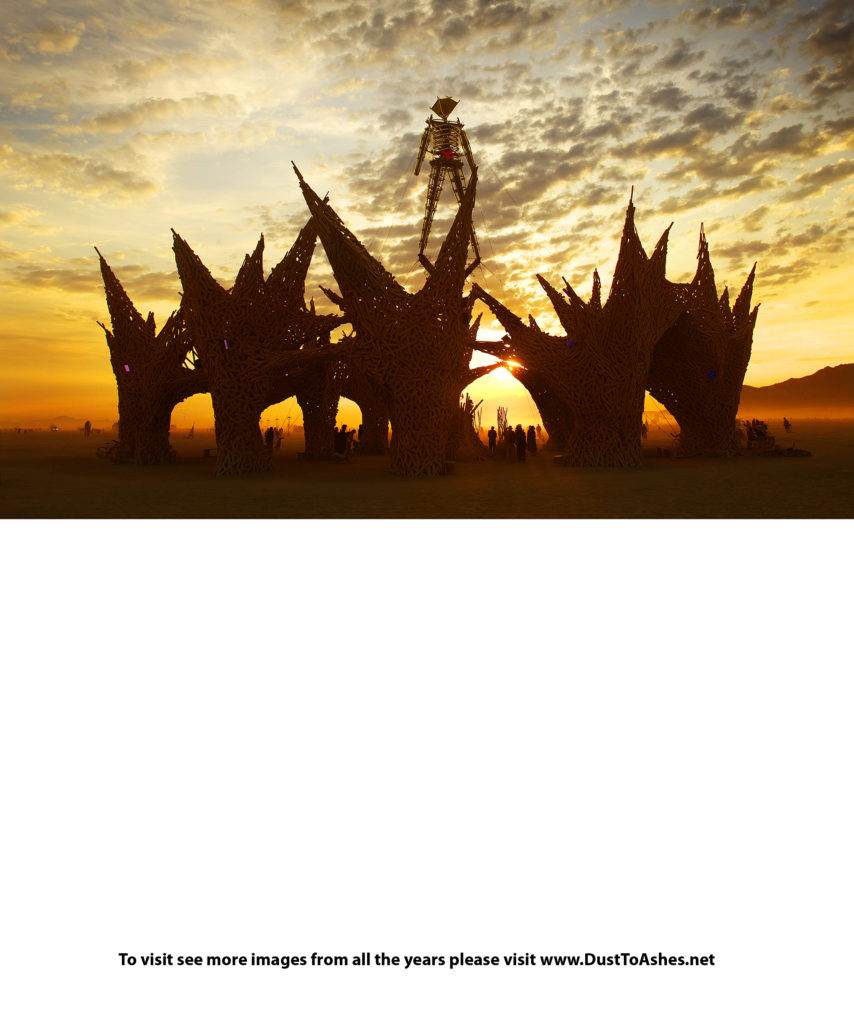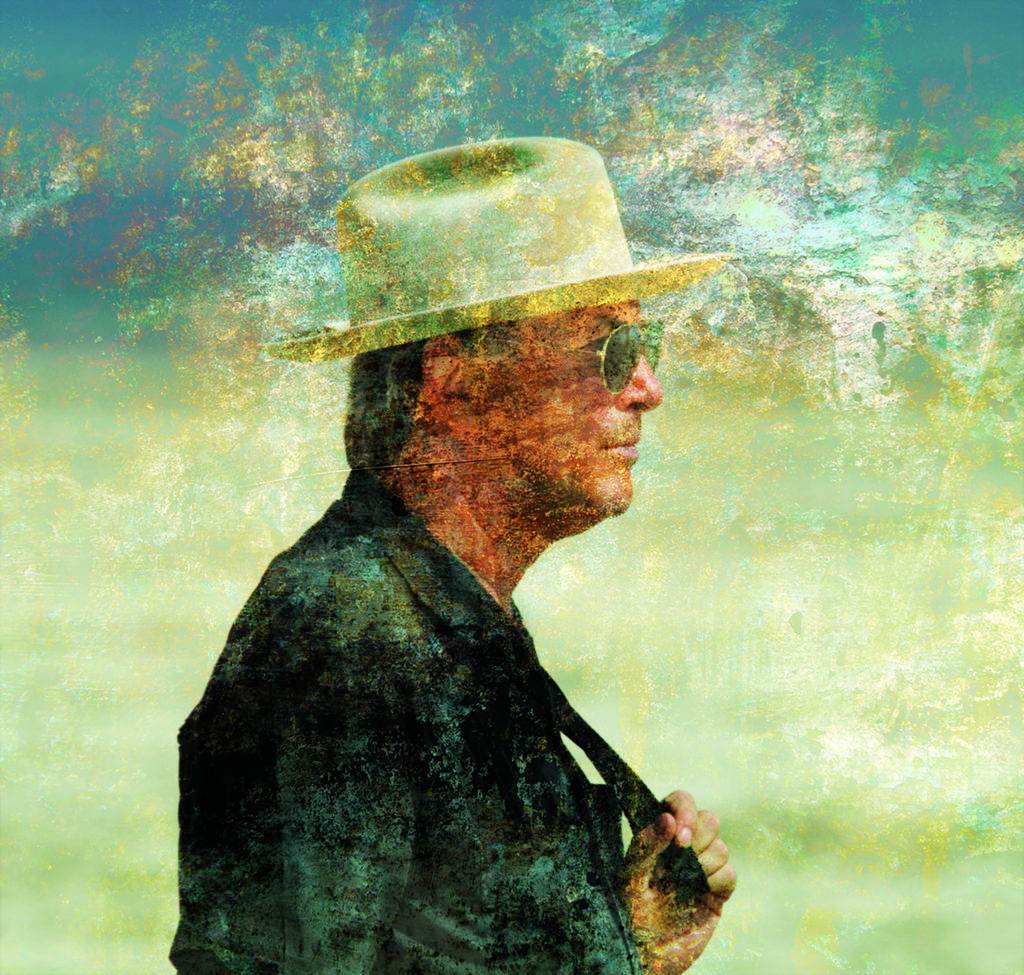
Burning Man founder Larry Harvey died on April 28th after suffering an earlier stroke. He was 70 years old. We loved Larry and will treasure his unique creative spark. Oh yeah… he really started something!
In commemoration we’re reprinting the 2016 Common Ground interview with him and pay homage to the ephemeral nature of all things—the underlying ethos of the Burning Man.
Thirty years ago on a whim, Larry Harvey and his buddy Jerry James built an eight-foot wooden man in their basement and decided to haul it to SF’s Baker Beach to burn it. Onlookers were drawn to the flames, and spontaneous performances ensued. The ritual took place annually three more times at the beach before the Golden Gate Police discovered the shenanigans and issued a prohibitive edict, forcing the merrymakers to find a new venue—a prehistoric desert lakebed near Gerlach, Nevada. There, Black Rock City, as it is known, swells from a population of zero to 70,000 leading into Labor Day weekend before resuming to homeostasis without a trace. A highly principled gathering espousing radical inclusivity, radical self-expression, and radical self-reliance, Black Rock faces challenging growing pains in the face of its massive international popularity.
Larry Harvey was born in Oregon in 1948 and was adopted by elder parents who shared their stories of the Great Depression and fleeing the dust bowls of Nebraska—an underclass upbringing that informs his viewpoint about the 1%/99% divide. We spoke with Larry in San Francisco on a broad range of topics including his recent trip to India and Nepal, spirituality, the natural, and the supernatural.
Common Ground: Times have changed. When we spoke back in 2009 I recall you were modestly proud that the New Yorker magazine had run a little cartoon mentioning Burning Man, as if the festival had just barely crested from discreet obscurity into the vernacular of literary circles.
Larry Harvey: That’s gone apace. Obama just made a joke mentioning his daughter wanting to go to Burning Man.
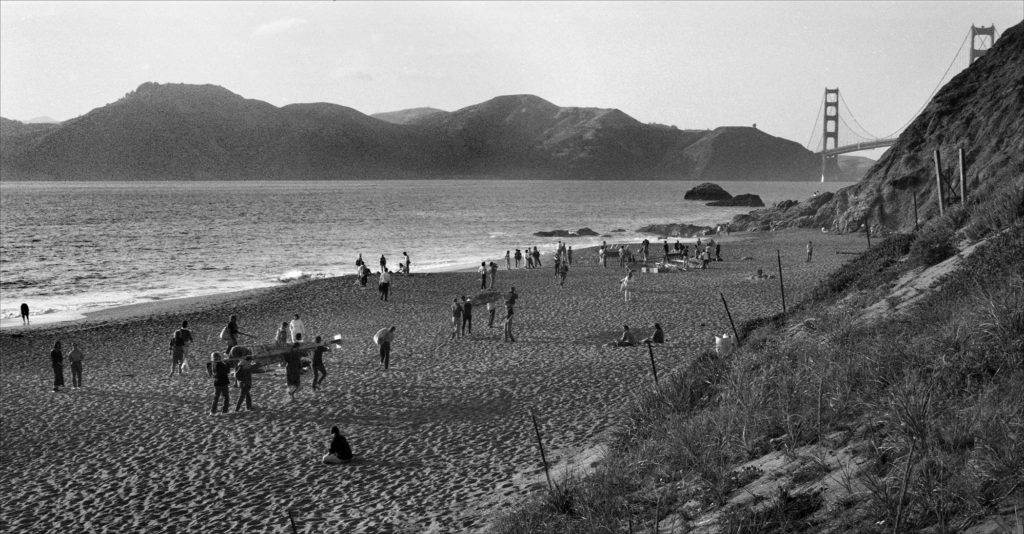
I think it’s a household term now. What was the joke?
It was at the annual [White House Correspondents’ Dinner]. The president is a talented comedian who can be wickedly funny. He knows how to do it and do it deadpan. He was joking about Bernie Sanders, saying, “I feel the Bern,” adding, “Just the other day a young person came to me and said, ‘I’m through letting politicians stand in the way of me and my dreams.’ And we said to Malia, ‘No, you can’t go to Burning Man.’” It was a very general joke, but by suggesting that even the president’s daughter might want to go to Burning Man is legitimating. That’s just an indicator of the degree of acceptance.
If our ideal had been to become a counterculture, then I suppose you could say, “Oh, you’ve lost your edge,” but I’ve never thought of it as counterculture. I’ve always thought of it as culture. So our notion is that we can affect the world, not the other way around.
As large-scale events go, 70,000 attendees is unexceptional.
It’s modest, like your average football game. But like rock concerts and water theme parks, normal entertainment probably isn’t going to affect the world much. One of our good results is that we’re getting about 20% coming from out of the country. You can walk out in Black Rock City and readily hear five or six languages. That shows where demand is coming from; it’s become a really international place.
What’s the distinction you’re making about rock concerts and such?
That they are about people in seats being entertained by someone else who is active. The crowd can cheer, but that’s the extent of participation. We’re not that—the people who come are the entertainment. They’re more than entertainment because it’s relentlessly participatory and predicated on wholehearted action that connects. It’s hard to not participate at Burning Man. It’s not some finished product that’s trotted out having been rehearsed and rehearsed and calculated to appeal to the public.
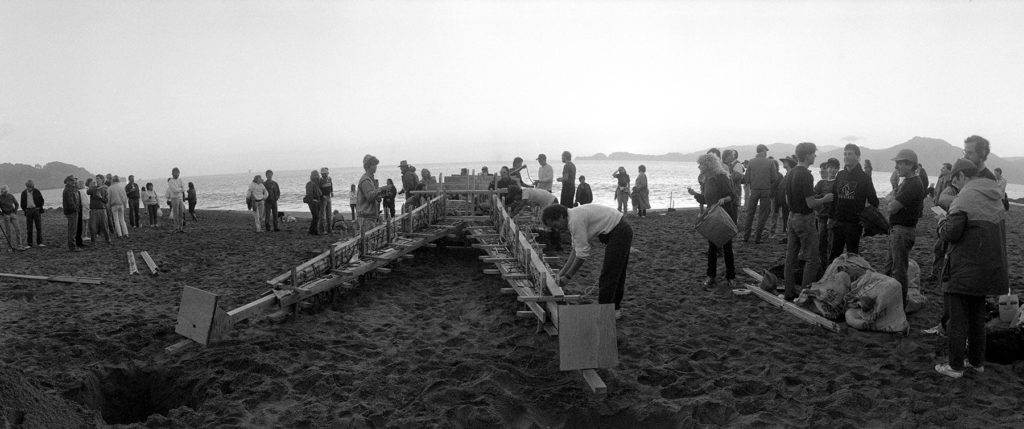
What do you think is the public’s stereotype about Burning Man?
I don’t know what the stereotype is, but I think that what motivates people to come is still rather old-fashioned—the rule of three. If one friend tells you and another one tells you and a third one tells you, it gives you a kind of a three-dimensional view of things. That’s when people say, “I’m going to go.”
I suppose people see the images on the Internet and think, “Yeah, that’s cool.” But it takes a great deal of determination, not only for tickets but all the preparation and the effort, which far exceeds what is normal. My gracious, when the president makes a joke about it, we’ve permeated the mainstream in some ways, which just means people are generally more receptive and are hearing more positive things now. The old [bacchanalian] stereotypes aren’t reported very often, and it begins to seem legitimate.
This is the festival’s 30th anniversary. How does that make you feel?
I’m not big on anniversaries, but yeah, it’s a good start. That’s how I look at it.
Can you point to specific turning points—landmarks along the way?
Most change is incremental, so you’re unaware as it creeps up, but there were certain dramatic turns that leapt up as new plateaus—change born out of struggle. Of course 1990 was a big year because that’s when we moved to the desert [from Baker Beach]. 1996 was a big year that reduced down to a disagreement about what Burning Man was about. A majority of us ended up saying we wanted to build a civil society to create a public environment where people could be secure enough to fully enjoy their freedom and be able to make contact with one another. That’s when we began to think of Black Rock City as a city. That was very hard to do in an environment where bullets were flying and cars were driving at reckless speeds with the lights turned out at night. Fear and freedom don’t go well together. Fear doesn’t make you free. So that was an argument. The origination of the temple [in 2001] was an important change that is now considered integral to the experience. That didn’t exist until David Best invented that.
Some say the addition of the temple created a spiritual component.
I’d like to think it was there incipiently. Of course my idea of spiritual is probably broader than most people’s. I know spirit when I see it. Spirit flies about on wings. It’s infectious. Team spirit—it’s infectious. It can turn mean, but spirit quickly animates people and can affect them with a bioelectric current. That was always there. No one might have labeled it spiritual. Certainly not those who think formal religions have a trademark on spirituality. But I think increasingly in our society, people don’t look at spirituality that way. There are all kinds of practices that are considered spiritual, many of which don’t involve worship.
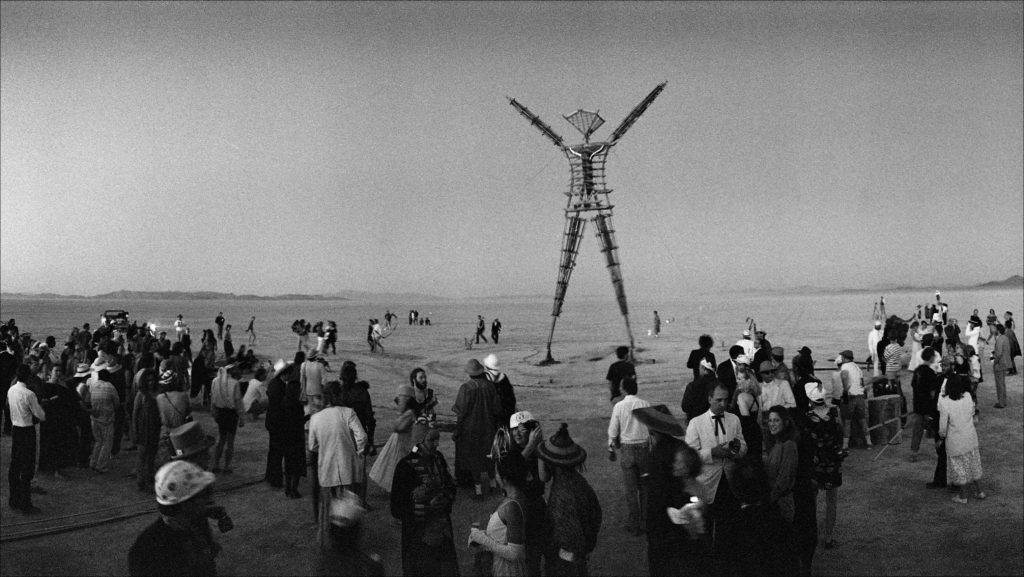
I want to talk about spirituality later but first want to discuss this timeline. It seems to me that a new era began after the event first sold out in 2011. Ticket mania ensued.
That was another landmark. The bad thing is that the demand for tickets being at a 4-to-1 ratio has put enormous stress on the community—it’s a supply-and-demand challenge. We’re in the middle of that and going to initiate a change this year that I think will surprise and gratify the community.
Once, you mentioned that Burning Man ran a unique ad in Common Ground long ago.
I think it was 1997. It might have been in the early 1990s. We were sweating that we would go broke, so we put in this little ad that was purposely made low context. You had to know something about Burning Man. It wasn’t “Burning Man, this, this, this!” which would be distasteful.
When we spoke back in 2009, you leaked in Common Ground that Burning Man would become a nonprofit. Even some employees and insiders learned of it for the first time then.
That’s been another landmark that’s doing great, developing its own legs. That’s enabled the next step we’ll be taking. There’s a picture that was done by a very talented artist that hangs in one of our restrooms, a big picture showing this stick-thin woman standing with this alarmingly large pink baby with a little hat on its head representing the nonprofit. The suggestion is that the nonprofit was going to become greater than the event, and that’s actually starting to happen.
But the LLC still exists.
It’s a wholly owned subsidiary, so it’s actually part of the nonprofit. I don’t own anything nor do the other five partners. We sold our shares for $46,000. If we just held onto it as private property, we’d all be multimillionaires.
I assumed that was the case.
No, it’s not the case—though there have been critics that have scoured records to try to discredit us. It’s required by law to do a nonprofit financial report every year, and ours was more forthcoming than most. We answered a lot of questions. My salary has been published and that of the other founders. That temporarily silenced the critics, who were astonished. I think they were reasoning from what they would do if they were in this position.
I don’t mind being an employee. I’ve now held this job as an employee for longer than I was ever employed. I was briefly employed as a bicycle messenger and as a taxi driver, but that’s about the extent of my normal employment experience.
One of your main roles is picking the theme each year. What in the collective zeitgeist led you to choose the “Da Vinci’s Workshop” theme?
Yes, that’s one thing I do. What happened during the Florentine Renaissance foretold the future. So we thought there were strong analogies with Black Rock City and Florence. Certainly it was a center of innovation, nearly equal to the Golden Age of Greece, where geniuses and art flourished as never before within a small span of time. I don’t think that was caused by a genetic anomaly—that all these geniuses were born. It was because society was so organized that it rewarded talent and led to a dynamic social interaction that opened the path. I wrote an essay called “Following the Money.” I was interested to know why Florence flourished in this precocious way. One way to understand it is to look at the economics.
The older I get, the more I’m interested in economics. That might seem odd because many people fancy that Burning Man is this moneyless utopia, but of course that’s ridiculous because we spend upwards of $32 million to produce that city, and the participants spend more than that. It’s true that commercial transactions aren’t happening there, but that’s the result of innumerable millions of commercial transactions that happen in preparation, such as raising money through crowdfunding and from contributions to build art. Looked at that way, $70 million to $80 million flow through the streets of Black Rock City every year. Many wealthier people have funded large art projects, but nobody knows about them because they never want their names mentioned.
You travel in interesting circles because you mesh with starving evicted artists and also with the modern-day Medicis, the billionaire caste against which there is a backlash.
They’re all part of Burning Man. Florence was supported by two big economic engines, the textile trade and banking. Up to 40% of the incomes of the wealthy was spent on clothes. The wives kept meticulous records about the clothes they bought, how they were altered, where they went. They inherited a medieval calendar, and there were constant public events, and they didn’t want to go to the next event in the same costume they wore at the previous one. It was social status.
They didn’t have Teslas then.
The wool guild built the great cathedral in Florence. They did these public works out of civic pride—like at Black Rock City. [Those public works] cradled the entire Renaissance that emerged, enlarging the identity of everyone, high and low alike. That was the norm of citizenship then, and it made Florence a beacon for the rest of Europe. It’s not quite the norm now, as people point out. You have people in the higher reaches of society who are just glorified consumers. They look like hogs at the trough and it makes people look innately selfish, but it doesn’t have to be that way. That’s been charged [at Black Rock City]—that there is a sherpa class that is sweated. But we think that we can lead people to a sense of rich and poor alike—and that’s rather an old-fashioned idea, isn’t it?
The trickle-down?
No, I don’t mean trickle-down. I mean that some of that wealth can flow down and then up like an artesian well. We’ve lived too long in a Hobbesian worldview that everyone is very selfish. America, looked at through eyes beyond our shores, is the most selfish nation on earth. We’ve monetary capital, but in the sense of the total sum of human connectedness—social capital—we are poor. Monetary capital isolates us further and further from one another until it looks like it could turn into a social civil war between the haves and have-nots.
How do you answer critics who now feel that Burning Man too reflects this reality?
Well, some people are amazed that this teeming international city isn’t free. I’ve heard that. “You mean it’s not free?” Well, no, it costs money, and that’s why we’re talking about money this year. We never said commerce was evil. What kind of idiocy is that? Do you think commerce is evil?
Personally not.
Well, I don’t know many people who do. If that’s evil then your shirt is evil, your pants, your shoes, your socks are evil. Where did you get them? You bought them, didn’t you? Did you tend the sheep and then weave those things? Do you live completely independently of every other human being and not engage in trade? Not even hunter-gatherers do that. They trade with one another. The unaided human is a pathetic thing. The only way we can survive is to cooperate and collaborate with one another, and [trade] is one way of doing it. Only a consumer would think that by going to the desert and living without exchanging species for eight days that they achieved some sort of salvation in a naughty world.
Burning Man mirrors that 1%/99% thing. We usually don’t point this out, but we, as the organizers of the event, are the government out there and have the federal presence, so we can work reforms that seem to be bearing fruit. The master reform was to say that we don’t want a class of people who can buy their way onto the playa, as it became rather apparent that too many had carried bad habits in their life with them onto the playa, and in their plug-and-play camps were living in gated communities. But every camp has its share of sparkle ponies.
What’s a sparkle pony?
That’s someone who doesn’t participate and help out. Camp chores? No, they’re too covered with glitter to do that, too narcissistically inclined. They say, “I want to be part of the camp. Oh, and there’s food, great! I’ll help.” They get there and put on their costumes, and they’re gone. You never see them again, except maybe at mealtime. Sparkle ponies are a widely distributed species. They’re just not incident to privileged camps. Show me a camp, and I’ll show you some sparkle ponies in it.
Societies have always protected themselves—particularly the 1%. They’ve gated themselves to avert being raided, to protect their women.
Yes and no. In great cities the rich and poor witness one another. We’re not going to wave a magic wand and say everybody is equal. Some people will always have more resources. I won’t say that everyone is talented either. But everybody in their being is equal. That’s an unconditional value. Radical equality—that we have in common. That’s where it lies—along that spiritual gradient.
Inequality and elitism are controversial and antithetical, but what can government do?
We did what Bernie Sanders is demanding. We use money from selling high-end tickets to subsidize low-income tickets. We can do that. During the whole ticket controversy, someone said, “Well, if you have to take money from these rich parasites, then I just hope these people aren’t thanked.” Well, those are interesting manners! The truth of the matter is that many wealthy people donate to art projects and don’t want to receive public attention.
A lot of things we can’t control, but for instance, we can control camp placement and some supplies. Everyone wants a good placement. So we show preference to theme camps because they do socially constructive things benefiting their fellow citizens. And we let them arrive early. If you want these privileges and conveniences, then you have to give. So we try to mandate some participation for this category of camp. And not just so you can say, “I interacted with the public. We put up a little stand and gave popsicles for an hour.” No, no. You know how theme camps are. But we can’t be like Mao and march the middle class to starve in the countryside. Or Pol Pot—that wasn’t nice. We’re gentle.
[Laughs] How do you police?
Because I wanted to see for myself, I wore this big worm costume that was hellish, like a sauna. In it I went out and visited some of these erstwhile plug-and-play camps that applied to be theme camps. I had a list. If they had a bar, I would order a drink to see if they’d serve a lowly invertebrate—this worm who just wandered in off the street. I actually had a good experience. I saw some things that needed improvement. I communicated some of that to our folks who are in charge of placing camps.
[Laughs] Did you ever let on that you were the mayor?
Well, I’m not the mayor, but I was clocked once.
You were punched?
Clocked—it’s a gay term for when you’re in drag and they catch you. No, I just wormed my way into the camp with my fellow, Tom Sawyer, who just died of cancer. He was a delightful man. He was the forward one, and I was just the worm that came in on his arm. “My wormy friend needs a drink. Please, sir.” I learned a lot. It was really interesting. I saw how they were adapting or falling short or surprising by giving more than anyone could’ve imagined. We worked that reform, and no one really noticed the nature of the reform we instigated. They didn’t see that if you organize society in a new way, and if you look at money and change society, you can cannibalize it to do constructive social things. All we’ve ever done is move the social furniture around so that it conditions behavior to make change. People who might seem like devils turn into angels, and it can happen readily because in the end, people want to feel real and be connected to one another. For all the addictions we have and our selfish consumption and all those things that isolate us from one another, what people yearn for deep down more than anything is connection. That’s why Burning Man is famous worldwide.
A city where the 1% and the 99% cohabitate.
The metaphor is the 1% and the 99%, but that’s only half the thought. Because if we think we can make progress in mending that split instead of just pandering to resentment and fear, then that will be an example in our little test tube experience. That’ll be an example that the world could profit from.
Economic disparity is dominating this conversation, but it’s also the national conversation.
It’s very much on our mind. Glamping—glamour camping—Burning Man for the high-end people—we don’t want to become that! I can speak for myself. I don’t come from the middle class, I come from the working class, the mud sills.
What are mud sills?
My father grew up in a mud hut called a soddy. That’s what they do on the Great Plains. They dig up the turf that was matted with roots, and they’d stack it up and make it into bricks. It’s called a sod house. My parents were dust bowlers from a humble walk of life. They left Nebraska after all the soil blew away. My mother went out to get the laundry one day, the white sheets flapping on the clothesline, and they were blood red, menstrual red. She looked up, and the sky was roiling red with windborne soil. “That’s Oklahoma,” said someone standing nearby. A Biblical catastrophe that ruined everyone. The height of my father’s worldly success was running Shorty’s short order café in this little obscure town of Hemingford.
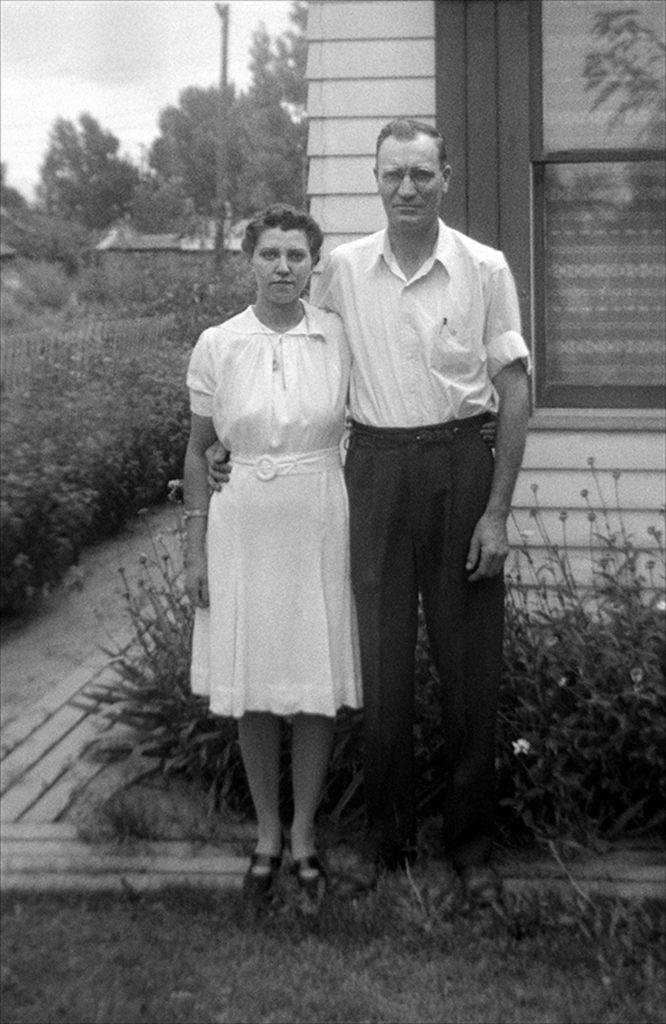
Where were you born?
I was born in Oregon in 1948. Both me and my brother were adopted, and my whole childhood was shadowed by those Great Depression dust bowl stories. At the time, the farmers who didn’t trust the banks did a kind of atavistic thing and put all their cash in safe deposit boxes so they’d have it secure. But when all the soil blew away, the bankers were pulling up the gangplank fast. They were going to sail away and wanted to protect their assets. They wouldn’t let the farmers open their safe deposit boxes. It was a terrible injustice. That’s what people in the underclass suffer daily. Today I’ve achieved a degree of worldly success and moved through all these strata of society, but I haven’t forgotten my roots. I know a lot of people who are not going to have a lot of money, and I see the world through that lens.
My father was born in 1899, something of a Victorian really, eloped with my mother and traveled, doing odd jobs like building silos. They made their way to Oregon in the early 1940s because there was money to be made on the West Coast in support of the war. He taught himself to be a carpenter and built one of the first campers—I think—before the RV. It was a Model A Ford, and he built a cabin over it so they could live in it, a modern version of a covered wagon. Refugees from the dust bowl pretty much had to invent something like that.
My father was a very self-reliant man who wouldn’t accept help from no one. But they also realized that if they stuck together, they could better survive than if they were alone, just like wagon trains. Oddly enough, both my parents would say rather wistfully, almost in a melancholy way, that during those years traveling with other people, someone could find macaroni and someone could find some tomatoes and then everybody feasted together. In a puzzled way they’d tell stories of deprivation but end up saying, “We really felt part of something.” And that maybe that was the happiest period of their lives together. So there’s something to be learned from that.
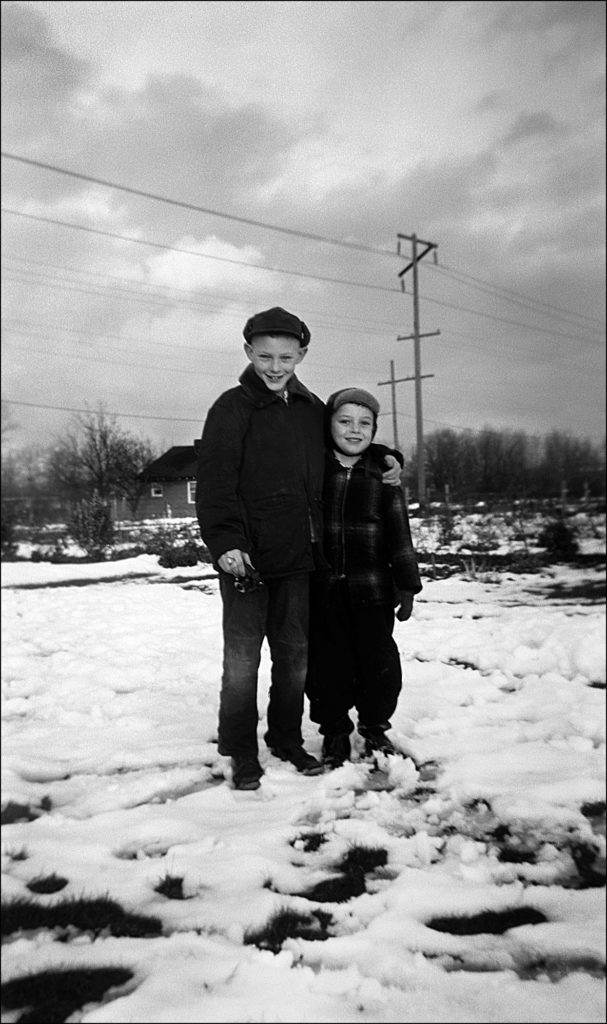
Was there a spiritual or religious framework you grew up with?
Nothing formal. Their church was the Masonic Lodge and camping. Those two things. As soon as my brother and I were old enough to make a choice and didn’t go to church, they quit going. They figured they had done their social duty. So I never heard God spoken of as a real thing, but they reverenced nature and would speak with awe of natural beauty. They came to the Northwest and had never seen anything like it. Such a well-watered land, so beautiful—some of the most fertile land on earth. They loved camping. Now that was spiritual.
What’s the story of your adoption?
It was a gray-market adoption. A lawyer and a girl “got into trouble,” as they used to say. I guess I was conceived in the back of a car. My parents loved us but were laconic and stoic and weren’t expressive. It was luck of the draw. I loved them and still have their pictures up in my home. My brother is an accomplished photographer. We were both adopted and were everything to each other. Both of us, for some reason that we don’t fully fathom, had this ambition toward art and wanted to accomplish something and be recognized for it. I like ambitious people who want to stand out and do something special. I don’t think they offend against the Democratic dogma.
Was your boyhood happy?
No. There I was on the farm, and I wanted the big city. I so badly wanted a sophisticated milieu. I even taught myself the word milieu. I was this pint-sized impresario who organized my classmates to do theatrical things, and I’d write and produce it and recruit the town and get the adults to bless it, but in all of that I was unhappy. We were estranged from people and didn’t socialize. There was hardly anybody my age for miles around. My brother was four years older, and his experience was different. He left when I was just hitting adolescence, so I was very unhappy.
Of course you’d wind up in San Francisco. When did you first arrive?
When I was in high school I hiked to the Haight just before the hippies discovered they were hippies. It was already there, ready like tinder, but they weren’t yet wearing hippie gear; they were dressing out of Goodwill. It was just loaded with young people, and you could feel the buzz of excitement. Then I came back and lived with a girlfriend just off Haight Street in the “Autumn of Love.” I then came back the last time in January to witness the “Winter of Love”—some interesting snapshots. I concluded that the hippie movement had no economic basis aside from selling drugs and getting checks from home. In the Winter of Love, the upper-middle-class hippies moved out or melded back, and it got violent and shady. An aerosol graffito said “We love you, Janice.” And someone else had written “Speed kills.” That pretty much says it all.
Did the hippie culture inform Burning Man in any way?
It never did historically. It was very down to earth in the beginning, with quasi-Bohemian carpenters—very San Francisco. Later on, the Cacophony Society showed up, and they were oddballs who spoke with a louder voice, so they made the history books. I was always attracted to odd, creative people—weirdos of one kind or another. Or freaks, as we called them. That was the highest praise you could give anybody. Is he a freak?
The circles quickly expanded and got heterogeneous pretty quick. I’m on a little one-man crusade to exhume the memory of the carpenters. Pre-Burning Man there was a little scene that I fell into. A fellow named Dan Richmond hosted a little soirée where we drank, played guitar, and talked about philosophy and art. That’s where I met Jerry James, who was my partner on the beach when we went down with the man. The help we recruited was from this construction milieu. That’s who the core was.
You went to Nepal and India earlier this year. My hope was to capture an interview on the phone while you were witnessing the other burning man, on the burning ghats [open cremation grounds] along the banks of the Ganges.
We didn’t make it to Varanasi. We were in Delhi and had adventures there. I liked it. Yeah, it’s pretty intense, culturally conditioned of course, and ordered in that way. I don’t have a problem with that. I grew up in a world that was wholly immediate. Grow food in the ground and plow the fields. Make your own furniture. In Kathmandu there were children wading around in this muddy and probably polluted pond gathering little fish to eat. It was pretty grody, but it didn’t really appall me.
Where I lived we had a very muddy lake where all the neighborhood urchins would go, and we shared this mud bank with the cows that would shit in the mud. We were happy as clams just to swim around in that lake. It took me back to the mud sills. I’m not trying to romance poverty, but I have enough sense to see when people are connected by folkways and some kind of ethos and a sense of shared experience—that’s my touchstone for value.
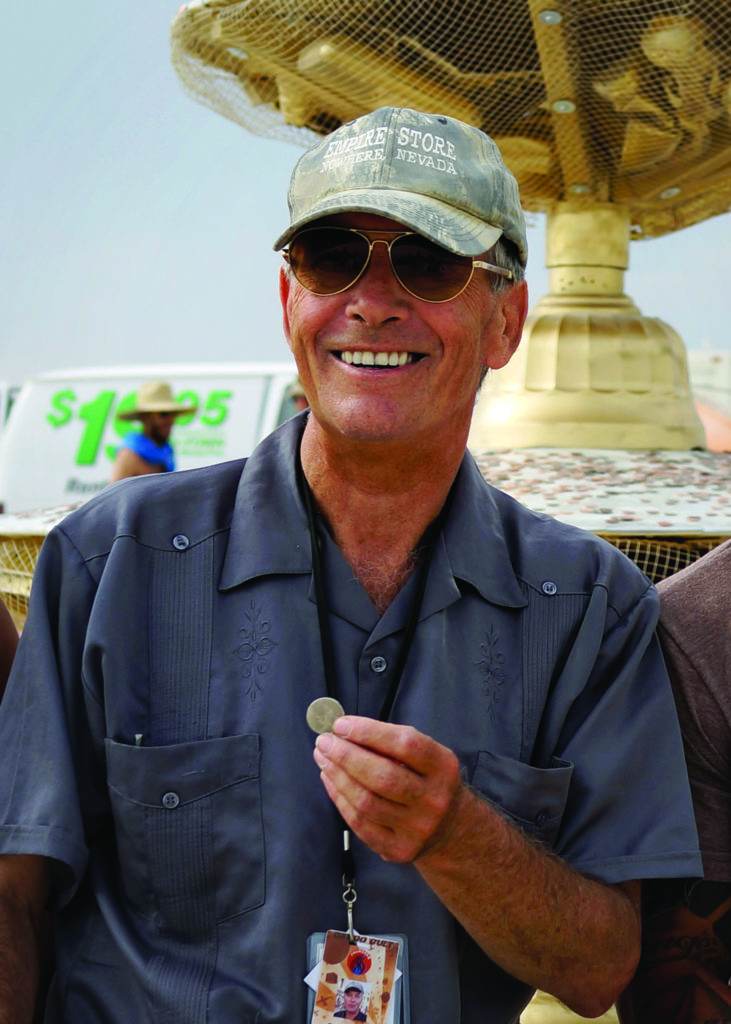
Have you studied much of the spiritual philosophy of India? Do you gravitate to that?
Not much. I’m interested but am not very well read there. There are interesting ideas you pick up by just living in California. I think a lot of the spiritual disciplines have great worth in America; they make sense to me. The only time I depart then is when it becomes supernatural. That’s because of a medical condition. [Laughs] In the presence of the supernatural, I break out in hives and the itching is unendurable. So if anyone attempts to convert me to a supernatural belief, I just get itchy. I thought about having it treated, but it actually serves me!
What’s your distinction between soul and supernatural?
Supernatural says there’s an invisible world that has all the attributes of our world except there’s no evidence for it. But only if you’re an adept can you understand it and can tell other people. That turns into power and it gets political, like someone controls the spigot. So there’s the spiritual guy with the spigot, and he releases [makes a knob-turning gesture] a little more, then a little more, and that’s an awful lot of power for anybody to have. Because I pay attention to politics, that tempers my understanding of religion. I’m an atheist by faith, but I’ve had mystical experiences which were real. They certainly formed me and changed me, but you can have a mystical experience and not believe in the supernatural. It’s not necessary. In fact, it might get in the way. A lot of spiritual teachers tell you, “Don’t get self-conscious about that.”
What about the notion of reincarnation?
To answer those questions, you don’t have any evidence so all you have is faith. When I talk to religious people, I’m not interested in their beliefs. I just talk to them about their faith—although sometimes their beliefs furnish anthropological interest. What I mean by that is that their choosing to disbelieve they’re supernatural helps me make my life more meaningful. It helps me find my way. Maybe it has to do with the fact that I was adopted as the founding experience of my life. You know—the parent that wasn’t. At an early age I decided that what I had was nature and an immediate experience of nature—wandering around in world solitudes.
How does your being adopted inform your beliefs?
It gave me an existential point of view. I was raised by people who said, “You are what you make yourself to be.” They didn’t dress it up as an intellectual notion. So I grew up relating to trees. Anything alive fascinated me. To this day animals fascinate me. Children too—any bloody thing. That’s God enough. It doesn’t have to be a landlord.
I haven’t thought about it to this instance, but maybe being severed from my blood parentage—which gave me a lot of pain—I’ve come to think was a great gift, a blessing—this feeling that you are what you do. That’s what Burning Man is. Out there people don’t say, “I’m a professor” or “I’m this” or “I’m that.” You just are what you manifest in this immediate place where everything seems hyperreal. That’s what I always wanted anyway. If it’s hyperreal, who needs God? That’s the only attraction—that God is that He, She, It—and is super real, the source of reality.
I like your image of the spigot holder.
I’m tempted to do a [variation on a] theme about that, but I don’t know if I can get away with it. I like The Simpsons—whenever they show God, he’s this outrageous gaseous vertebrate thing with many eyes and limbs, profoundly alien. To me as a kid, no one ever talked about religion as if it were real. So it just seemed flabbergasting, like something in a not very good comic book.
I was raised to see nature and high ethical ideas, such as my father had, as a source of spiritual, soulful connection. He didn’t call it “right action,” but the symbol of the Masons is a square and compass, so he being a carpenter was a sucker for that. Moral strength and an inner compass—that’s right action and that’s enough. In my view, this is it—not like some moral credit card of “I’ll make it up in my next life” but this meaningful experience, in the present. This [pointing to the ground] really counts! Not some nonsense of “maybe when I get up the karmic ladder, things will be okay.” This is the ride. That’s just my conviction.
After all the semantics, I think the message is “Thou art That.”
Thou art That, yeah. Again and again and it comes back to the mystic underpinnings of religion. Every religion starts out that way and then becomes more institutionalized and political and coercive and hierarchical. But I’ve been to good churches of different faiths—synagogues and California kinds of churches. I’ve lectured there and feel comfortable there. I just speak to their faith. The dean of Grace Cathedral said to me, “Well, you are a theologian, aren’t you?” I thought that was very cool.
I have a trope I’ve used. I say to them, “If I were to put a bunch of people from different beliefs together in a cage and said, ‘You figure out what God is and what’s the right view,’” it’s conceivable that when I came back there wouldn’t be a hank of hair or piece of bone left—that they’d kill each other [pounds fist] over what’s unconditionally real. That would be the history of religions. It starts with Thou art That and turns into Supreme Being. Why can’t we invert Supreme Being back to being is supreme? A great burden would be lifted.
Of course, you remind me of my conversation last year with your friend David Best, the pound-the-table nonbeliever temple builder.
Isn’t that a funny fact, that these artists who make temples as a tribe are mostly atheists?
[Laughs] I am sorry, but he’s such an unconvincing atheist, you know, building these superb temples all around the world and helping people. Again, maybe it’s semantics but maybe—They are That. Maybe They are—Being Supreme.
David is soulful and has a spirit—we all do. And he is really, really good at communicating spirit. Art is a spiritual thing. Anybody who understands anything about art understands that it’s a spiritual proposition. A vision is defined by the light that comes out of it, not the light that shines on it. Artists create visions. That’s what they do. That’s what makes them a handful sometimes.
How does it feel to be the founder of Burning Man?
I don’t spend a lot of time thinking about that. It can be nice to walk into a room and think that people are inclined to like you. It can be a nuisance, and it can be very off-putting. There’s no point complaining about it since everywhere I go, everybody just wants to talk about Burning Man.
Your legacy might wind up in the history books.
Legacy, schmegacy. Yes, the older you get the more you think in terms of affecting the future. So even as your vitality begins to falter, it’s tremendously heartening that something is going to grow beyond the term of your life. It’s nourishing in the present and gives heart to live. The idea that they’ll be talking about me in 100 years—what kind of garbage is that? [Laughs] Big deal, I’ll be dead, and I don’t believe I’ll look down from heaven, obviously.
Rob Sidon is publisher and editor in chief of Common Ground.
